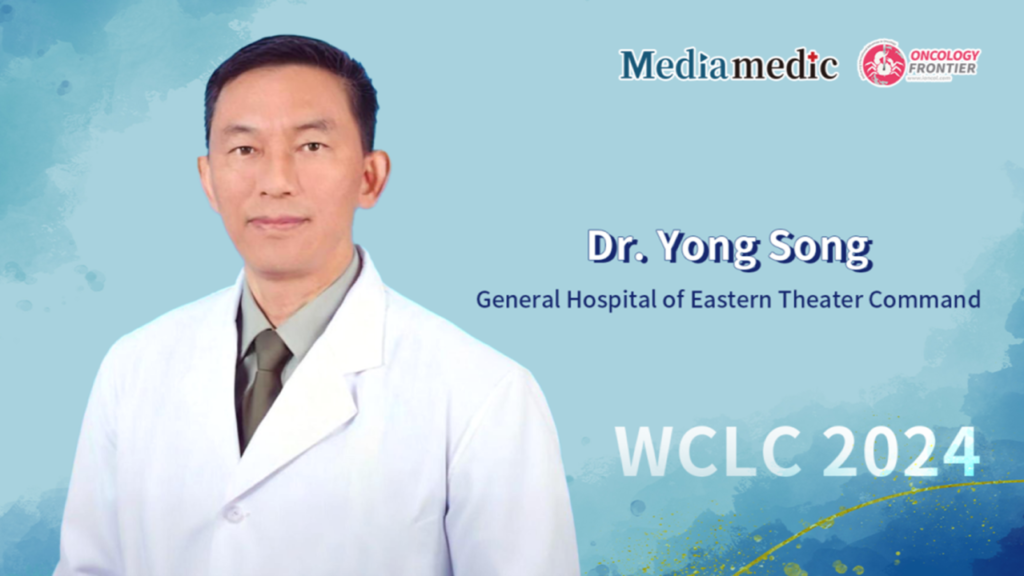
A patient-level analysis of the phase III CheckMate 77T trial (NCT04025879) and the phase III CheckMate 816 trial (NCT02998528) revealed that perioperative treatment with nivolumab for resectable non-small cell lung cancer (NSCLC) patients reduces the risk of disease recurrence or death by approximately 40%, compared to neoadjuvant nivolumab plus chemotherapy alone. This article presents Dr. Yong Song from General Hospital of Eastern Theater Command’s insights on the analysis results (Abstract PL02.07).This analysis included patients from the CheckMate 77T trial (neoadjuvant nivolumab plus chemotherapy followed by surgery, with at least one dose of adjuvant nivolumab post-surgery) or the CheckMate 816 trial (neoadjuvant nivolumab plus chemotherapy followed by surgery without adjuvant immunotherapy). The primary endpoint was event-free survival (EFS) from the time of surgery, assessed by blinded independent central review (BICR).
In his presentation at the 2024 World Conference on Lung Cancer (WCLC), Patrick Forde, MBBCH, from Johns Hopkins University School of Medicine, noted: “This analysis may help us understand the potential benefits of perioperative treatment with nivolumab (neoadjuvant nivolumab plus chemotherapy followed by adjuvant nivolumab) and further supports its use in eligible patients.”
Key Findings
In the CheckMate 816 and CheckMate 77T trials, the median follow-up was 29.5 months and 33.3 months, respectively. After adjusting for differences in baseline characteristics using propensity score weighting, perioperative nivolumab treatment (N=139) showed improved EFS compared to neoadjuvant nivolumab plus chemotherapy alone (N=147). Specifically, the hazard ratio (HR) for EFS was 0.61 (weighted average treatment effect, ATE) and 0.56 (weighted average treatment on treated, ATT). In an unweighted analysis of all patients who underwent surgery, the HR was 0.59.
The pathological complete response (pCR) rate was 40.7% in the perioperative treatment group, compared to 30.5% in the neoadjuvant group. Even when stratified by pCR status, perioperative treatment provided EFS benefits over neoadjuvant treatment alone, with the greatest EFS benefit observed in patients who did not achieve pCR but received adjuvant nivolumab post-surgery.
Subgroup analyses based on tumor PD-L1 expression revealed that perioperative treatment significantly improved EFS in resectable NSCLC patients, regardless of PD-L1 expression levels. For patients with PD-L1 <1%, the HR for EFS was 0.51 (95% CI: 0.28-0.93), while for patients with PD-L1 ≥1%, the HR was 0.86 (95% CI: 0.44-1.70).
Additionally, EFS improved across all tumor stages. For patients with stage IB-II NSCLC, the HR was 0.53 (95% CI: 0.25-1.11), and for stage III NSCLC patients, the HR was 0.63 (95% CI: 0.37-1.07) when comparing perioperative to neoadjuvant treatment.
The safety of perioperative nivolumab was generally manageable, with no new safety signals observed. In the perioperative treatment group, 16% of patients experienced treatment-related adverse events (TRAEs) leading to discontinuation, compared to 11% in the neoadjuvant group. Surgery-related adverse events occurred in 38% of perioperative patients and 42% of neoadjuvant patients.
Dr. Yong Song: In the absence of a randomized controlled trial, this cross-trial analysis compared perioperative immunotherapy with neoadjuvant immunotherapy for resectable NSCLC using individual patient-level data from two phase III randomized trials. The CheckMate 816 study demonstrated significant and clinically meaningful improvements in EFS and pCR with neoadjuvant nivolumab plus chemotherapy compared to chemotherapy alone in resectable NSCLC patients. Building on these findings, the MD Anderson Cancer Center team led by Tina Cascone conducted the CheckMate 77T trial, which assessed perioperative nivolumab and showed statistically and clinically significant improvements in EFS and pCR compared to the control group.
This analysis, presented at the 2024 WCLC, compared EFS between patients from the CheckMate 77T and CheckMate 816 trials. The results suggest that perioperative treatment improves EFS significantly more than neoadjuvant treatment alone in resectable NSCLC patients, regardless of pCR status, PD-L1 expression, or tumor stage. Postoperative adjuvant immunotherapy may provide additional benefits.
Despite the limitations of propensity score weighting, the results of this cross-trial analysis provide compelling evidence supporting the use of perioperative nivolumab as an effective treatment option for resectable NSCLC. This is the first patient-level analysis demonstrating that perioperative nivolumab offers superior efficacy over the standard neoadjuvant nivolumab plus chemotherapy. As this cross-trial analysis is exploratory in nature, the results should be interpreted cautiously. However, the findings are highly encouraging and provide clinicians and patients with evidence to guide treatment decisions.
References:
- Forde P, Peters S, Donington J, et al. Perioperative vs Neoadjuvant Nivolumab for Resectable NSCLC: Patient-Level Data Analysis of CheckMate 77T vs CheckMate 816. Presented at: 2024 IASLC World Conference on Lung Cancer; September 7-10, 2024; San Diego, CA. Abstract PL02.08.
- Jonathan Spicer, et al. Neoadjuvant nivolumab (NIVO) + chemotherapy (chemo) vs chemo in patients (pts) with resectable NSCLC: 4-year update from CheckMate 816. 2024 ASCO abstract LBA8010.
- Cascone T, Awad MM, Spicer JD, et al. Perioperative Nivolumab in Resectable Lung Cancer. N Engl J Med. 2024 May 16;390(19):1756-1769.
Dr. Yong Song Chief Physician, PhD Supervisor Department of Respiratory and Critical Care Medicine, Jinling Hospital, Nanjing University Medical School Thoracic Oncology Center, Tianyinshan Hospital of China Pharmaceutical University Director, Nanjing University Institute of Respiratory Diseases Member, Respiratory Disease Branch, Chinese Medical Association Chairperson, Respiratory Disease Branch, Jiangsu Medical Association President-Elect, Respiratory Branch, Jiangsu Medical Doctor Association Board Member, Chinese Society of Clinical Oncology (CSCO) Editor-in-Chief, Translational Lung Cancer Research; Editorial Board Member, Chinese Medical Journal


